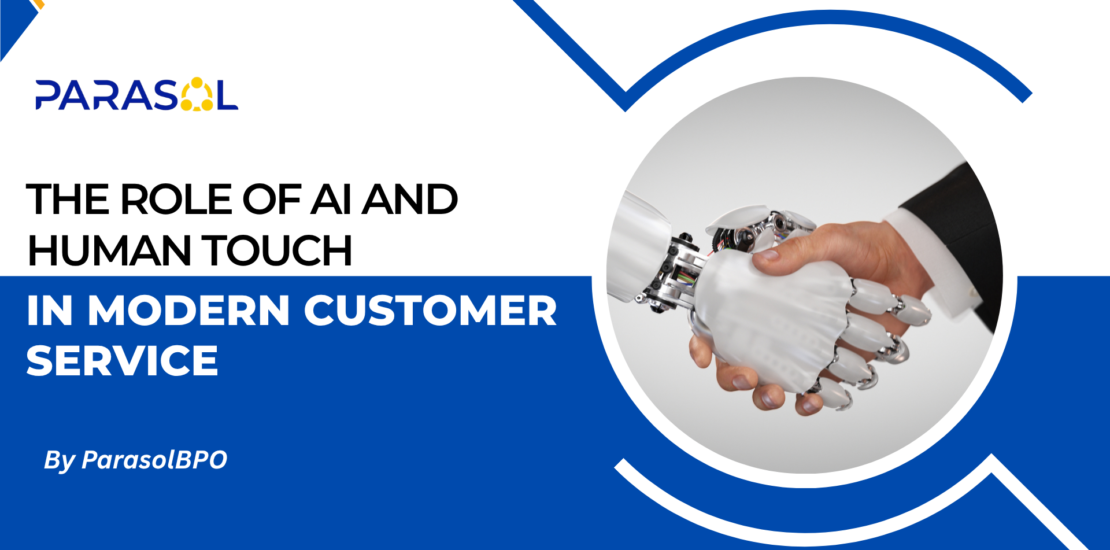The Role of AI and Human Touch in Modern Customer Service
- October 20, 2025
- Posted by: parasolbpo
- Category: Talent Outsourcing

In today’s digital-first business environment, customer expectations have never been higher. They want support that is not only fast but also personal, accurate, and consistent across every channel. The challenge for businesses lies in delivering all of this at scale, balancing efficiency with empathy.
This is where Artificial Intelligence (AI) and the human touch intersect. While AI has revolutionized the speed and scope of customer service, the human element remains indispensable for creating trust, emotional connection, and brand loyalty. The future of customer service isn’t about choosing between automation and human interaction, but about integrating both to complement each other.

The Rise of AI in Customer Service
AI has fundamentally reshaped the way businesses engage with customers. With advancements in machine learning, natural language processing, and predictive analytics, AI systems can now understand, anticipate, and even resolve customer needs with remarkable accuracy.
Modern customer service platforms are powered by chatbots, virtual assistants, and automated routing systems that work around the clock. These tools can instantly handle a wide range of tasks, from tracking orders and resetting passwords to answering frequently asked questions. The result is faster response times, greater availability, and consistent service delivery.
AI also plays a critical role behind the scenes. It helps businesses analyze large volumes of data to identify common issues, customer sentiment, and emerging trends. Predictive AI can even anticipate potential problems before they occur, enabling proactive communication. For example, if a software company detects through AI analysis that a feature is causing frequent user confusion, the support system can automatically send guidance before customers reach out.
This ability to operate at speed and scale has made AI indispensable in the modern support ecosystem. However, while technology can process data and deliver instant responses, it cannot replicate the emotional understanding that defines genuine customer relationships.
The Importance of the Human Touch
Customer service, at its core, is a human experience. It’s about listening, empathizing, and finding solutions that not only address the problem but also leave the customer feeling valued.
No matter how advanced AI becomes, it lacks the ability to truly empathize. When a customer is upset, frustrated, or confused, they often need more than efficiency, they need reassurance. A human agent can interpret tone, express compassion, and build rapport in ways a machine cannot. This emotional intelligence transforms service from a transaction into an experience.
Human agents also bring adaptability and judgment that AI still struggles to achieve. Many customer interactions require context, understanding the story behind the issue, the nuances of a complaint, or the implications of a decision. For example, resolving a billing dispute or handling a sensitive escalation demands empathy, reasoning, and the ability to make discretionary choices that align with company values.
Furthermore, customers often equate human interaction with authenticity. A friendly, empathetic agent can restore trust after a negative experience or turn a dissatisfied user into a loyal advocate. In essence, while AI creates efficiency, the human touch creates connection.

Where AI and Humans Work Best Together
The most effective customer service models today are not human-only or AI-only, they are human-AI hybrids, where each complements the other’s strengths. AI handles routine and repetitive tasks, freeing up human agents to focus on complex or emotionally charged issues.
For instance, an AI-powered chatbot might handle initial inquiries, gather key details, and resolve simple requests. If the issue requires deeper assistance, it seamlessly transfers the conversation, along with all relevant context, to a human agent. This ensures the customer doesn’t have to repeat information, while the agent can immediately focus on problem-solving.
Behind the scenes, AI can also act as an intelligent assistant to support agents. It can analyze real-time data, suggest responses, or provide relevant knowledge base articles during live chats. This not only improves accuracy but also allows agents to respond faster and more confidently.
By merging automation with empathy, companies can achieve the best of both worlds: speed, scalability, and personalization.
Balancing Technology with Humanity
The key to modern customer service lies in balance. Too much reliance on AI can make experiences feel robotic and impersonal. Too much reliance on human labor can make operations slow, inconsistent, and costly. The ideal approach is a carefully designed framework where technology amplifies human capability rather than replaces it.
To achieve this balance, businesses must be deliberate in how they deploy AI. Automation should be used where it enhances convenience, such as quick answers, instant routing, and 24/7 support, but human involvement should be preserved wherever empathy, creativity, or judgment are required.
Equally important is training and empowerment. Customer service teams must learn how to collaborate with AI tools effectively. This means understanding when to rely on automation and when to take control. When human agents and AI systems operate as partners, the customer experience becomes seamless, efficient yet personal.

The Future of Customer Experience
As technology continues to evolve, the distinction between AI-driven and human-driven service will become increasingly fluid. Advanced conversational AI systems are already learning to interpret tone, intent, and emotion, bridging the gap between automation and empathy. However, the human element will remain central to trust-building and brand loyalty.
The future of customer service is one where AI enables agents to be more effective, not obsolete. Instead of spending time on repetitive inquiries, human agents will focus on higher-value interactions, delivering empathy, strategy, and problem-solving that machines can’t replicate.
At Parasol BPO, we’ve seen this transformation firsthand. By integrating intelligent automation with skilled human agents, we help businesses deliver service that’s not only faster and more efficient but also deeply human. AI provides the data, speed, and consistency; our people provide the understanding, adaptability, and care. Together, they create a customer experience that is both intelligent and compassionate.
Conclusion
Modern customer service thrives on the synergy between technology and humanity. AI enables speed and scalability, while human agents provide empathy and authenticity. When both elements work together, businesses don’t just solve problems, they build trust, loyalty, and long-term relationships.
The role of AI and human touch is not a competition but a collaboration. It’s the perfect balance between machine precision and human empathy, and it represents the future of exceptional customer experience.
At Parasol BPO, we believe that every customer deserves both, the efficiency of AI and the warmth of human connection. Because great service isn’t just about responding quickly, it’s about making every interaction feel personal, purposeful, and genuine.
Ready to scale smarter, not harder? Book your Free Consultation today.
#CustomerService #AI #CustomerExperience #CX #Automation #HumanTouch #ParasolBPO #BPO #CustomerSupport #DigitalTransformation


